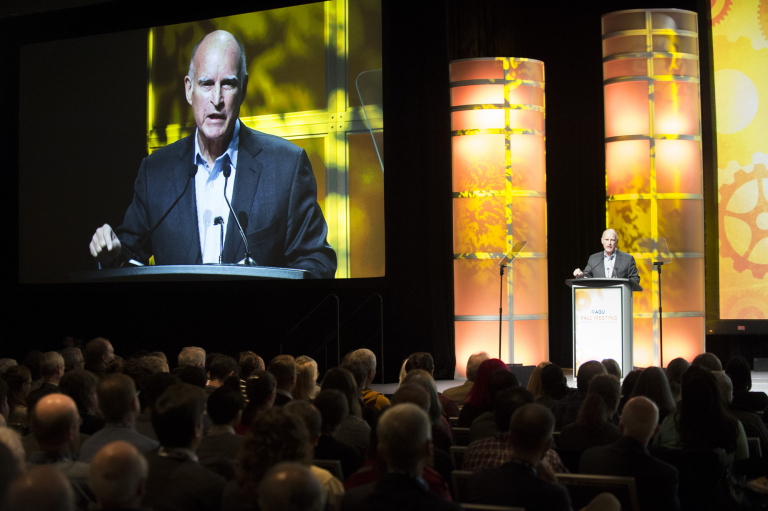A fiery Gov. Jerry Brown on Wednesday rallied scientists fearful that decades of crucial climate data could disappear after President-elect Donald Trump takes control of the federal government.
Brown delivered an emotional speech to hundreds of scientists at the annual fall meeting of the American Geophysical Union at San Francisco’s Moscone Center. Whipping up researchers and advocates, Brown told the crowd not to worry if the Trump administration tries to delete key climate databases.
“Look, we have a lot of databases in California and we can take a few more,” he said to a standing ovation. “We are ready to fight.”
Alarmed by a president who has said climate change is a “hoax,” researchers are racing against the clock to copy massive amounts of government data onto independent servers. Organizers hope that this will safeguard the information from political interference.
Trump has loaded his cabinet with nominees who have questioned the overwhelming scientific consensus of human-caused climate change. Throughout the campaign, Trump and his advisers were adversarial toward environmentalists, and said that he wanted to dismantle many of President Barack Obama’s environmental policies and hobble the Environmental Protection Agency.
Bob Walker, a senior Trump campaign adviser, recently told The Guardian that NASA-funded climate-change research should be scrapped as part of a pushback to what he called “politicized science.” Instead, he said, the agency should focus on the exploration of deep space.
“We see NASA in an exploration role, in deep-space research,” Walker said. “Earth-centric science is better placed at other agencies where it is their prime mission. My guess is that it would be difficult to stop all ongoing NASA programs, but future programs should definitely be placed with other agencies. I believe that climate research is necessary but it has been heavily politicized, which has undermined a lot of the work that researchers have been doing. Mr. Trump’s decisions will be based upon solid science, not politicized science.”
In a move that sent ripples of fear across the Department of Energy, Trump’s transition team requested the names of researchers who have attended international climate talks or have been working on climate science. The Energy Department is refusing to provide any names and has said that the survey smacks of McCarthyism.
Trump tapped former Texas governor Rick Perry for the Energy Department. During a 2012 Republican presidential debate he vowed to eliminate the agency, although he could not remember its name when detailing his anti-regulatory agenda. He called climate change “one contrived phony mess.”
In his speech Wednesday, Brown said California’s economic growth can in part be attributed to its climate rules, and he mocked Perry’s anti-envrionmental policies.
“Now our new secretary of energy, he came to California and said, ‘Come to Texas,we have all the jobs in Texas.’” Brown told the audience. “Great. Well, I have news for you. California is growing a hell of a lot faster than Texas. We have more sun than you have oil.”
That was reference to Perry’s infamous 2013 “business recruitment trip” to California to encourage businesses to move to the Lone Star State. The poaching expedition came after California imposed new taxes at the end of 2012.
Brown has made climate change central to his agenda and has signed several climate change related bills in the past year, including SB32, which requires the state to cut greenhouse gas emissions to 40 percent below 1990 levels by 2030.
This fall, Democrats secured a two-thirds supermajority in the state Legislature, and many expect state lawmakers to push for a landmark climate program. Supporters of Brown believe that he will lead a push for legislation to solidify the state’s market-based cap-and-trade program to reduce carbon emissions.
In his address to the American Geophysical Union, Brown urged scientists to consider the Golden State a data sanctuary. His message: If the country does not act on climate change, California will.
“We have the laws,” Brown said. “We have the tools of enforcement, and we have the political will. We will set the stage we will set the example. Whatever Washington thinks they are doing, California is the future.”
Richard Alley, a Pennsylvania State University glaciologist and outspoken climate-science advocate, said that if federal data were to vanish — or if funding for research were slashed — it could be damaging “to the future health, safety and welfare of people, our economic well-being and even our national security.”
“‘Climate’ and ‘weather’ are not separate things, but studied by overlapping communities with overlapping tools, and share the characteristic that better knowledge of both can be used to help the economy and the safety of people,” Alley said. “Satellites looking down to study flow of glaciers can also see the changes in the Earth as volcanoes inflate or deflate from moving magma that might affect the likelihood of damaging eruptions. For this administration, or any new administration, it is part of our job as scientists to make clear how the science fits into the well-being of people today and in the near future as well as in the more distant future.”
He added that “our president-elect may tweet with a cell phone that works because it has a computer designed using the principles of quantum mechanics and a GPS locating itself with relativistic calculations. What once seemed the most esoteric of science — Einstein and Bohr and Feynman — is an indispensable part of the workaday world.”
Outside of California, scientists and database experts are compiling a online repository to harbor scientific information before Trump is inaugurated on Jan. 20. The effort began with a tweet from Eric Holthaus, a meteorologist and prolific writer on climate change.
“These data sets are priceless,” Holthaus told the Washington Post Tuesday. He said that any gap in the record “greatly diminishes their usefulness.”
The University of Pennsylvania is hosting a new website to build a “refuge for federal climate and environmental data vulnerable under a federal administration which denies the fact of ongoing climate change.”
It’s part of a broader effort to help the Internet Archive, a nonprofit organization that stores web pages, movies, music and other web materials at its offices in San Francisco’s Richmond District. Its End of Term 2016 project is an effort to archive all federal web pages before the inauguration. Trump and his transition team have not commented on the effort to copy publicly available data onto private servers.
The archive, which costs $15 million a year to maintain, has catalogued government websites before and after major elections since 2008. Brewster Kahle, founder and digital librarian at the archive, said that even during a normal change of administration, a “dramatic” amount of material is typically lost.
“Even during the inauguration, if you hit refresh, you can see things disappear,” he said.
Kahle said he was especially worried about the incoming Trump administration because “some of the cabinet officials have said they are not interested in having the department they are involved in to even exist.”
Storing old website material is a complicated process. It often requires moving vast amounts of data from one server to another, year after year in collaboration with partner organizations around the world. Kahle said storing a terabyte of data forever costs roughly $2,000.
“We accumulate petabytes of data every year; the storage cost alone is millions,” he said. “It’s important. The U.S. government puts out a lot of information, and at the end of terms, a lot of it goes away.”










